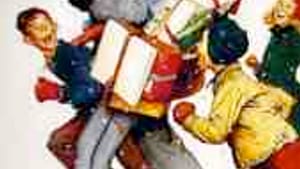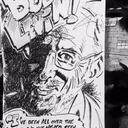Stay in the Loop
BSR publishes on a weekly schedule, with an email newsletter every Wednesday and Thursday morning. There’s no paywall, and subscribing is always free.
Practical education, 1961: My brief career as a mailman
You've got mail, 1961 (Memoir)

Following my freshman year at Brandeis, I worked one week on the Frank's Beverages production line in Philadelphia. The factory was hot, the tasks monotonous, and the foreman forbade us even one gratis grape soda.
Then I received notice that my civil service score had qualified me as a summer substitute mailman. This was 1961, before mailwomen or need for the gender-neutral term "carrier."
I was assigned to a station off Lancaster Avenue, around 62nd Street. It served portions of West Philadelphia and, maybe, Delaware County. At least I recall tree-lined streets that struck me as suburban, on hills so steep that ropes ran the length of every sidewalk to assist ascents when they turned icy.
My first morning, a 20-year regular, whom I'll call Malcolm, took me out for a tutorial. We rode in his oil-burning DeSoto to the Linton's at 54th and City Line, where he bought breakfast. This act in itself was instructive, since (a) the rules posted by the back door forbade the use of personal vehicles and (b) we were on the clock. Between bites of scrambled egg and pulls on his Camel, Malcolm explained how each day's work had been carefully planned by experts in Washington.
"'Casing' the mail
The mail had been separated by route when you arrived, so your first job was to case it— that is, to place each piece within a multi-shelved rack, with a slot for each address, in the order it would be delivered up: one side of a street, down the other, with excursions to the side as the route demanded. When done, you pulled your first deliveries, strapped them together, and put them in your bag. Then you pulled and strapped the rest and put it in canvas sacks for delivery to relay boxes along your way.
"Casing" was designed to take two hours. Delivery took five. You had one hour in the station for loose ends.
"The government spent millions designing these routes, eight hours to the fuckin' minute," Malcolm said. "No way—" he jabbed a fork-speared sausage at me— "no fuckin' way a rookie like you finish faster than a seasoned veteran, y'unnerstan' whadime sayin'?"
He was saying mailmen held second jobs tending bar, on government time. Or they had women in whose apartments they passed idle hours. I watched quiz shows with an aunt in Overbrook Park or hung around a swimming pool where a girl I knew who was entering Mount Holyoke taught children to dog paddle.
Preferential treatment
The fellow in the cage who handed out assignments— I'll call him Berkowitz— was in year eight or ten at Temple and greatly admired Abraham Maslow, the father of humanistic psychology. My attendance at Brandeis, where his idol taught— even though I'd never heard of "self-realization" before I met Berkowitz— won me preferential treatment. Berkowitz punched me in early and shielded me from the most Herculean labors.
Still, I delivered the entire district. The melting pot hadn't yet homogenized West Philadelphia, and the veterans knew to take off Fridays in Jewish neighborhoods (when the Exponent arrived), and in Negro neighborhoods (when Jet did), and in Irish or Italian when their favorite publications arrived. (Everybody wanted off for TV Guide.) The length of a day depended on how many houses went mail-less, and on such days hardly any did.
Forbidden short cuts
Even so, life in service to the federal government was pleasant. I relished the fresh air, the freedom to set my own pace. If a supervisor looked over my shoulder, I never knew it. I learned to step over the rails that divided porches, rather than walk down and up the steps as the rules required. I held out magazines of interest to read at lunch, and tried to shield them from hoagie drippings.
If I found letters out of order, rather than return to the house I'd missed, I returned them to the station for re-delivery. (Sure, the mail must go through, but who said it couldn't wait 24 hours?) When it rained, there were bars or luncheonettes for shelter. When it hit the 90s, my clientele offered ice water. The Sealtest plant gave out Dixie cups.
Everyone was happy to see me, except the occasional dog. Mailmen warned each other"“ and reminded themselves"“ with red cards in the address slots where such beasts resided. Once, having hopped a rail, I found myself holding such a card I had overlooked and simultaneously realized I shared the porch with a sprawled, shaggy creature about the size of Cerberus. He blinked"“ and must have decided it was too hot to treat me as a lamb chop.
Loose on the streets
What is it about those portions of that summer that linger? That cling to memory as nourishment or for instruction?
The warmth of the girl on the grass beside the pool. The order that the casing imposed upon the chaos of the day's deliveries. The toting of the sack against the beating sun, up hills and steps and over railings, betting against the improbability of meeting the demonic dog. The thrill of my self loose upon the streets, filling slots and boxes, committed to the task but, through my customized defiances, redefining it"“ and, with each defiance (and, to be sure, with each compliance), inking in the gradually emerging definition of myself.
Then I received notice that my civil service score had qualified me as a summer substitute mailman. This was 1961, before mailwomen or need for the gender-neutral term "carrier."
I was assigned to a station off Lancaster Avenue, around 62nd Street. It served portions of West Philadelphia and, maybe, Delaware County. At least I recall tree-lined streets that struck me as suburban, on hills so steep that ropes ran the length of every sidewalk to assist ascents when they turned icy.
My first morning, a 20-year regular, whom I'll call Malcolm, took me out for a tutorial. We rode in his oil-burning DeSoto to the Linton's at 54th and City Line, where he bought breakfast. This act in itself was instructive, since (a) the rules posted by the back door forbade the use of personal vehicles and (b) we were on the clock. Between bites of scrambled egg and pulls on his Camel, Malcolm explained how each day's work had been carefully planned by experts in Washington.
"'Casing' the mail
The mail had been separated by route when you arrived, so your first job was to case it— that is, to place each piece within a multi-shelved rack, with a slot for each address, in the order it would be delivered up: one side of a street, down the other, with excursions to the side as the route demanded. When done, you pulled your first deliveries, strapped them together, and put them in your bag. Then you pulled and strapped the rest and put it in canvas sacks for delivery to relay boxes along your way.
"Casing" was designed to take two hours. Delivery took five. You had one hour in the station for loose ends.
"The government spent millions designing these routes, eight hours to the fuckin' minute," Malcolm said. "No way—" he jabbed a fork-speared sausage at me— "no fuckin' way a rookie like you finish faster than a seasoned veteran, y'unnerstan' whadime sayin'?"
He was saying mailmen held second jobs tending bar, on government time. Or they had women in whose apartments they passed idle hours. I watched quiz shows with an aunt in Overbrook Park or hung around a swimming pool where a girl I knew who was entering Mount Holyoke taught children to dog paddle.
Preferential treatment
The fellow in the cage who handed out assignments— I'll call him Berkowitz— was in year eight or ten at Temple and greatly admired Abraham Maslow, the father of humanistic psychology. My attendance at Brandeis, where his idol taught— even though I'd never heard of "self-realization" before I met Berkowitz— won me preferential treatment. Berkowitz punched me in early and shielded me from the most Herculean labors.
Still, I delivered the entire district. The melting pot hadn't yet homogenized West Philadelphia, and the veterans knew to take off Fridays in Jewish neighborhoods (when the Exponent arrived), and in Negro neighborhoods (when Jet did), and in Irish or Italian when their favorite publications arrived. (Everybody wanted off for TV Guide.) The length of a day depended on how many houses went mail-less, and on such days hardly any did.
Forbidden short cuts
Even so, life in service to the federal government was pleasant. I relished the fresh air, the freedom to set my own pace. If a supervisor looked over my shoulder, I never knew it. I learned to step over the rails that divided porches, rather than walk down and up the steps as the rules required. I held out magazines of interest to read at lunch, and tried to shield them from hoagie drippings.
If I found letters out of order, rather than return to the house I'd missed, I returned them to the station for re-delivery. (Sure, the mail must go through, but who said it couldn't wait 24 hours?) When it rained, there were bars or luncheonettes for shelter. When it hit the 90s, my clientele offered ice water. The Sealtest plant gave out Dixie cups.
Everyone was happy to see me, except the occasional dog. Mailmen warned each other"“ and reminded themselves"“ with red cards in the address slots where such beasts resided. Once, having hopped a rail, I found myself holding such a card I had overlooked and simultaneously realized I shared the porch with a sprawled, shaggy creature about the size of Cerberus. He blinked"“ and must have decided it was too hot to treat me as a lamb chop.
Loose on the streets
What is it about those portions of that summer that linger? That cling to memory as nourishment or for instruction?
The warmth of the girl on the grass beside the pool. The order that the casing imposed upon the chaos of the day's deliveries. The toting of the sack against the beating sun, up hills and steps and over railings, betting against the improbability of meeting the demonic dog. The thrill of my self loose upon the streets, filling slots and boxes, committed to the task but, through my customized defiances, redefining it"“ and, with each defiance (and, to be sure, with each compliance), inking in the gradually emerging definition of myself.
Sign up for our newsletter
All of the week's new articles, all in one place. Sign up for the free weekly BSR newsletters, and don't miss a conversation.

 Bob Levin
Bob Levin